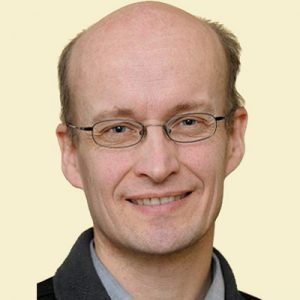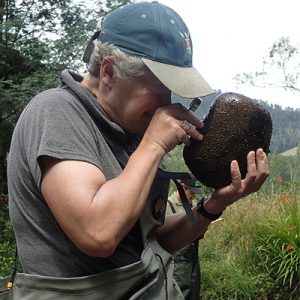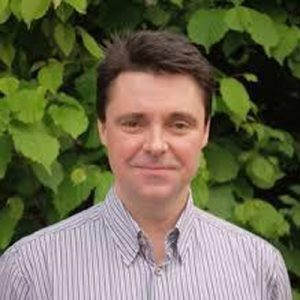Jill Lancaster - School of Geography, University of Melbourne, Australia
I have broad research interests in the biology of aquatic insects, their population and community ecologies. An over-arching theme in my research lies in understanding how interactions between the physical environment and biological processes influence ecological systems. More specifically, I am interested in how the persistence and coexistence of stream-dwelling insects are influenced by the fluvial landscape of stream channels, i.e. the sedimentary landscape created by geomorphological and hydraulic processes, and the temporal variations in water flow. At small-scales, this has involved work on bio-physical coupling and defining how bed topography and near-bed flow patterns influence movement behaviours and species interactions. At larger scales, this has involved landscape-scale field experiments to test how the abundance and spatial distribution of resources, in conjunction with species' dispersal capabilities (adult flight and larval drift), determines the structure of populations and metacommunities. Because aquatic insects have complex life cycles, ecological events must be integrated across life stages to construct complete life histories and to really understand population- and community-level phenomena. Compared with larvae, the egg, pupal and adult stages of aquatic insects are largely neglected and current work focuses on understanding their autecology. Oviposition is a critical stage for insect populations and much of my recent research examines how the spatial distribution of oviposition sites and behaviours influences species distribution patterns and can lead to species coexistence within communities.
Daniel Hering - Department of Aquatic Ecology, University of Duisburg-Essen, Germany
 I have started my career as an entomologist and gradually developed to an aquatic ecologist.
I have started my career as an entomologist and gradually developed to an aquatic ecologist.
My first research activities (and I am still interested in these topics) addressed dispersal patterns of aquatic insects, food sources of ground beetles along alpine rivers and the impact of hydropower plants on competition patterns in riparian habitats. As a postdoc, I worked on the impact of wood debris on river morphology and assemblages. Since 1997, I am employed by the University of Duisburg-Essen and its predecessors (since 2010 as a professor for Applied Hydrobiology). Ever since, the focus of my work was on assessment and restoration of streams, rivers and floodplains. Together with my colleagues, I developed the assessment systems Perlodes, which is based on benthic invertebrates, and is applied for assessing rivers in Germany. The projects on assessment and restoration were funded by the German Federal Environment Agency, the Working Group of Federal States on Water Problems, and – in particular – the European Union. Three EU-funded projects were coordinated by my group: AQEM (www.aqem.de), WISER (www.wiser.eu) und MARS (www.mars-project.eu). Currently, I am working on the effects of multiple stressors on rivers, the classification of ecological preferences (www.freshwaterecology.info) and – increasingly – on urban rivers. I teach ecology, limnology and zoology for degree programmes in biology and Transnational Water Management (www.twm-master.com).
Frank Vassen - European Commission, DG Environment, Unit D3 – Nature protection, Brussels, Belgium
I was trained in Namur/Belgium as a freshwater biologist in the late 1980s, doing a PhD on the ecology of freshwater salmonids in the frame of a reintroduction project for the Atlantic salmon.
However, my professional career quickly became focused on nature conservation, when I started working for a Belgian nature NGO on EU funded conservation projects, focussing on bird and grassland conservation. Later on I joined Ecosystems Ltd. to work as an external consultant for the LIFE program. In 2003, I started in the European Commission as a civil servant, working for 9 years in the LIFE program unit.
I am current working as a team leader in the Nature Protection Unit ENV.D3 in the General Directorate for the Environment of the European Commission in Brussels. Our unit is responsible for the follow-up of the implementation of the EU Birds and Habitats Directives, and of the Natura 2000 network of sites established under these directives. My current area of work inter alia covers issues of financing of Natura 2000, the LIFE program, agricultural policies and the biogeographical seminars.
Ádám Lovas‐Kiss - MTA Centre for Ecological Research‐DRI, Department of Tisza Research, Debrecen, Hungary
 I am an assistant research fellow at the MTA Centre for Ecological Research-DRI Department from Tisza Research. I did my BSc, MSc and PhD studies at the University of Debrecen Department of Botany. During my bachelor studies I worked mainly on orchid ecology and later switched to study waterbird-mediated dispersal of plants and invertebrates. I spent over a year in the Estación Biológica de Doñana (CSIC, Spain), to study different waterbirds. My main research interest is what kind of plant and invertebrate species are dispersed by waterbirds, how plant traits affect their dispersal, and how seasonality and environmental factors influence the communities dispersed by waterbirds.
I am an assistant research fellow at the MTA Centre for Ecological Research-DRI Department from Tisza Research. I did my BSc, MSc and PhD studies at the University of Debrecen Department of Botany. During my bachelor studies I worked mainly on orchid ecology and later switched to study waterbird-mediated dispersal of plants and invertebrates. I spent over a year in the Estación Biológica de Doñana (CSIC, Spain), to study different waterbirds. My main research interest is what kind of plant and invertebrate species are dispersed by waterbirds, how plant traits affect their dispersal, and how seasonality and environmental factors influence the communities dispersed by waterbirds.


